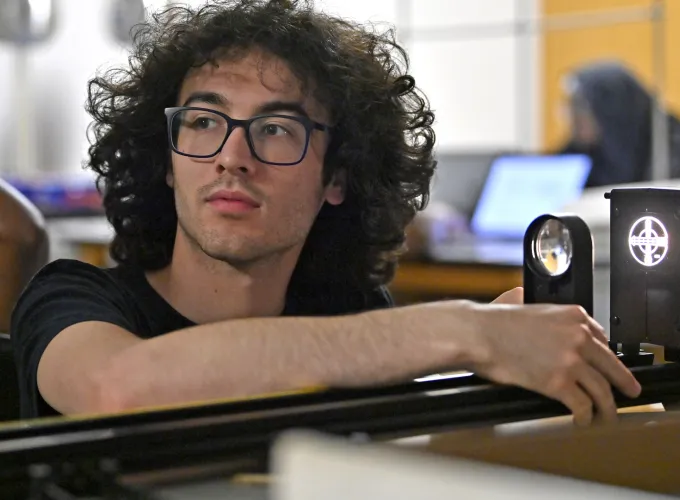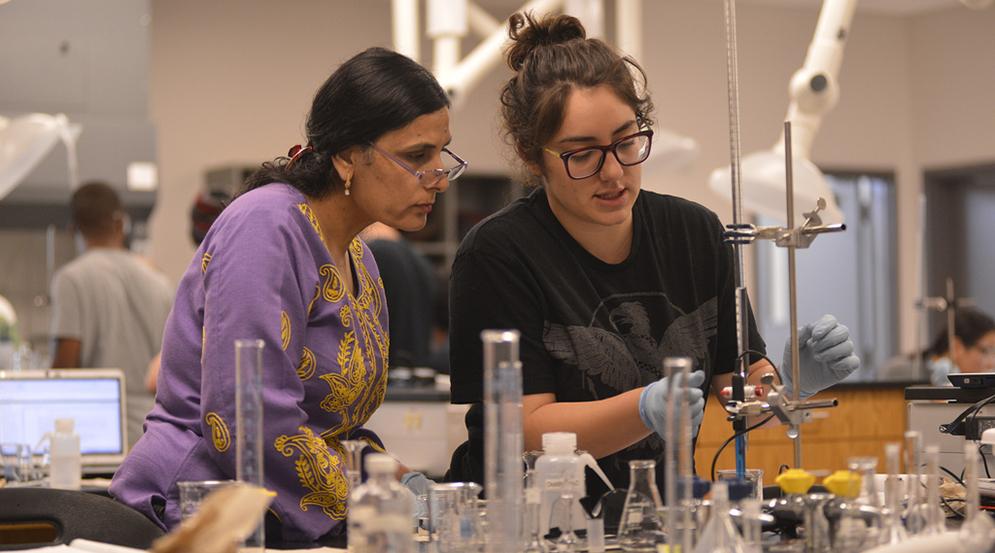SST Research, Internships and Service Learning
At GGC, all SST majors are required to demonstrate mastery of their discipline through research, service learning or an approved internship.

Research Opportunities
Faculty-mentored collaborative research opportunities offer a variety of topics, starting in your freshman year.

STEC-2500 prepares students with a better understanding of the research process and scientific method. STEC-2500 also provides students with a strong background for STEC-4500 and other research opportunities.
Access the STEC undergraduate research resources
Resources include:
- Open the "STEC Mentors_Topics" spreadsheet to browse research projects, keywords and faculty mentors for current opportunities.
- Connect with faculty research supervisor for permission to participate.
- Read STEC-2500 course syllabus.
- Complete STEC-2500 Faculty/Student Research Agreement.
- Email questions to STECcoordinator [at] ggc.edu (STECcoordinator[at]ggc[dot]edu).
STEC-4500 applies your understanding of the research process and scientific method to faculty-mentored research projects.
Access the STEC undergraduate research resources
Resources include:
- Open the "STEC Mentors_Topics" spreadsheet to browse research projects, keywords and faculty mentors for current opportunities.
- Connect with faculty research supervisor for permission to participate.
- Read STEC-4500 course syllabus.
- Complete STEC-4500 Faculty/Student Research Agreement.
- Email questions to STECcoordinator [at] ggc.edu (STECcoordinator[at]ggc[dot]edu).
Internship Opportunities
Approved internships allow students to have real-world experiences in a business, industry, service or government setting. At the conclusion of internships, participants typically prepare reports and posters, summarizing their experiences to present at SST-sponsored events or off-campus academic conferences, or to publish in the appropriate literature.
Internship Requirements
- Work with the internship coordinator to develop your internship opportunity in advance of the internship semester. Students must have secured an internship prior to their enrollment in the class. Enrollment in ITEC 4900 is done by the coordinator; students do not enroll themselves in this class.
- You must have obtained junior standing or higher and have completed ITEC 2150 (Intermediate Programming), ITEC 3100 (Networking), ITEC 3200 (Introduction to Database), ITEC 3900 (Professional Practices) by the start of the semester in which you plan to intern.
- Students must have secured an internship prior to their enrollment in the class. Enrollment in ITEC 4900 is done by the coordinator; students do not enroll themselves in this class.
ITEC Internship Application and Deadlines
- Fall semester: March 10
- Spring semester: Sept. 10
- Summer semester: Jan. 10
Explore BIOL 4800 Internship Course
Explore CHEM 4800 Internship Course
Service Learning Opportunities
Service learning provides students with opportunities to apply classroom knowledge to real-world experiences.

1.
Technology Ambassadors Program (TAP)
The Technology Ambassadors Program (TAP) aligns with GGC’s four pillars – scholarship, leadership, service and creativity – with a focused commitment to service learning. This award-winning program also addresses a need to increase the number of students who persist in an IT major or IT minor, particularly those underrepresented in computing.
Student Benefits
- Enhanced technical, communication and leadership skills
- Technical projects that demonstrate experience on your resume or graduate school application
- Exciting opportunities to build strong peer networks, and contribute and get involved in your community
- Increased confidence, especially when speaking in front of groups and demonstrating leadership qualities
- Affiliation with national STARS Leadership Corps with possible funding to attend STARS Celebration, an annual leadership conference.
Both the GGC TAP program and student participants have received recognition for innovative leadership and awards for conference presentations during STARS events. Learn more about STARS Computing Corps, the non-profit that provided grant funding to establish TAP in 2012.
Scholarships provide opportunities for TAP ambassadors to attend regional and national conferences and workshops, and participants have subsequently achieved numerous awards for their student research and poster presentations. TAP ambassadors also participate in National Science Foundation research experiences for undergraduates at GGC and through opportunities at other universities. TAP experiences ultimately propel many students onto graduate school and assist them in achieving acceptance into highly competitive graduate programs.
TAP participation creates opportunities for student-driven, peer-to-peer instruction in introductory STEM courses and GGC outreach initiatives.
Students serving as technology ambassadors (TAs) work in a team of 3-4 students with a faculty instructor. TAs gain exposure to specific technologies, collaborate with faculty experts and achieve a deeper understanding by teaching what they’ve learned.
Examples of Technologies
- Online games (Scratch)
- Games (Processing, Unity, etc.)
- Hardware controllers (Arduino, Makey Makey)
- Python (Earsketch and PyGame)
- Robots and drones (Codrone, Sphero, etc.)
- Augmented reality (EchoAR)
- 3D printing
Team Deliverables
- Create a fully-developed technology project.
- Develop and lead three workshops in IT general education classes.
- Participate in service learning at TAP Expo, GGC Super Saturdays Series (S3), Atlanta Science Festival, GGC CREATE, and/or STaRS symposia.
- Produce and present a poster and/or research paper at research event.
- Document project on GitHub TAP Organization repository.
Individual Expectations
- Assist as student leader in workshops and other events.
- Attend multiple service learning activities.
- Write reflection papers and journal the experience.
- Update resume and cover letter.
- Participate in external professional development activities.
Priority Application Dates
- Submit by March 31 for spring semester
- Submit by Oct. 31 for fall semester
Program Requirements and Selection Process
- Complete TAP application (below).
- Interview with TAP faculty to determine preparedness and eligibility.
- Enroll in STEC 4800 (requires faculty approval): 3-credit hour service learning internship TAP course.
Search the class schedule for course availability, using the following steps:
- Follow link to class search.
- Select a semester.
- Locate and select “Science & Technology” in the subject list.
- Hit “Class Search” button.
- Scroll STEC-4800 options for Internship Service Learning specific to TAP.
2.
Peer Supplemental Instruction (PSI)
The Peer Supplemental Instruction (PSI) program serves two purposes: 1) supports student academic success in STEM-related courses, and 2) provides service learning leadership opportunities for junior and seniors wishing to excel in STEM-related degree programs.
Peer Supplemental Instruction (PSI) supports academic success in STEM-related coursework (science, technology, engineering, math).
Peer Supplemental Instruction leaders participate in service learning opportunities through enrollment in the STEC-4800 course (3-credit hours). PSI leaders are guided through this experience by PSI faculty.
PSI Leader Benefits
- Plan and facilitate study sessions for your peers.
- Strengthen your knowledge of the coursework material.
- Gain confidence in your ability to persist in the STEM pipeline.
- Develop important job skills including leadership, time management, teamwork and public speaking.
- Demonstrate experience to add to your resume or graduate school application.
- Fulfill degree requirement:
- biology capstone
- upper level elective for chemistry, information technology or math
Candidates must have and maintain 3.0 GPA for science- and math-related courses and are selected based on an interview process.
Email PSI [at] ggc.edu (PSI[at]ggc[dot]edu) for more information.
The PSI program is funded and supported by the STEM IV Initiative Board of Regents of the University System of Georgia and the National Science Foundation under NSF Award No. 1623779.
